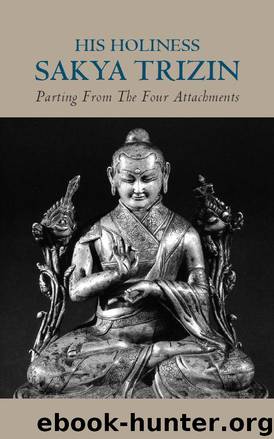Parting from the Four Attachments by Trizin Sakya

Author:Trizin, Sakya [Trizin, Sakya]
Language: eng
Format: azw3
Tags: Vajrayana, Sakya Trizin, Buddhism, Mahayana, Sakya Pandita
Publisher: Shang Shung Publications
Published: 2012-01-19T02:00:00+00:00
2.2. The Second Line
The second line says: "If you have attachment to this worldly existence, you do not have renunciation". With attachment to worldly existence you are not on the path leading to enlightenment: that is why one must give up attachment to worldly existence. The world of existence, wherever you might be, always has the nature of suffering. If we want proper renunciation to arise it is important to remember the suffering of samsara or of the world of existence. According to the teaching there are three types of suffering in samsara: the suffering of suffering, the suffering of change and the suffering of the conditioned nature of all things. Suffering of suffering means the suffering we normally consider as such, like physical pain, mental anxiety, worries and so forth: this suffering is mainly in the lower realms. If we carefully meditate on this, this suffering is unbearable: one's physical body could be trembling and shaking, and if one were forced to bear such suffering there would be no way to stand it. For example, even now a tiny bit of fire scorching our body or a tiny needle piercing it can cause great pain: in the lower realms beings are burning, on fire, and there are different kinds of weapons piercing their bodies, so how can a being bear all this? The situation is such that if we do not practise virtuous deeds and instead plant the seed to fall down into the lower realms the result will be pitiful for us. Then if we reflect on the suffering of change, this refers to what I said at the beginning: there are many beings falling down from the higher realms to the lower ones. Even the king of Devas, who was born in such a high position, falls down as well taking rebirth as a very poor, ordinary person. Like the sun and moon which are very bright and give light to the whole universe because of their position, one could find oneself in this dimension of light and then subsequently be born in a totally dark place where one cannot even see one's own hands. In ancient times there were universal emperors who ruled over many continents because of their high and powerful position, but then they would take rebirth as ordinary servants. All these things are clearly mentioned in Buddha's teaching, but we are ordinary persons unable to understand them directly, because we cannot see the hell realm, the god realm, etc. Therefore the easiest way to understand the suffering of change is to examine our human situation: rich people becoming very poor, powerful persons becoming weak, a family with many members dying out, etc.
Then if you reflect on the suffering of the conditioned nature of all things, this means that whatever we do is suffering and there is no end to it, no matter how hard we work and how much effort we do, there is no end to our actions. There is suffering when
Download
This site does not store any files on its server. We only index and link to content provided by other sites. Please contact the content providers to delete copyright contents if any and email us, we'll remove relevant links or contents immediately.
The Way of Zen by Alan W. Watts(6578)
Ego Is the Enemy by Ryan Holiday(5392)
The Art of Happiness by The Dalai Lama(4116)
The Book of Joy by Dalai Lama(3959)
Why Buddhism is True by Robert Wright(3434)
Spark Joy by Marie Kondo(3284)
Shift into Freedom by Loch Kelly(3181)
Happiness by Matthieu Ricard(3031)
A Monk's Guide to a Clean House and Mind by Shoukei Matsumoto(2895)
The Lost Art of Good Conversation by Sakyong Mipham(2637)
The Meaning of the Library by unknow(2552)
The Unfettered Mind: Writings from a Zen Master to a Master Swordsman by Takuan Soho(2288)
The Third Eye by T. Lobsang Rampa(2248)
Anthology by T J(2194)
Red Shambhala by Andrei Znamenski(2175)
The Diamond Cutter by Geshe Michael Roach(2052)
Thoughts Without A Thinker: Psychotherapy from a Buddhist Perspective by Epstein Mark(2000)
Twilight of Idols and Anti-Christ by Friedrich Nietzsche(1884)
Advice Not Given by Mark Epstein(1869)
